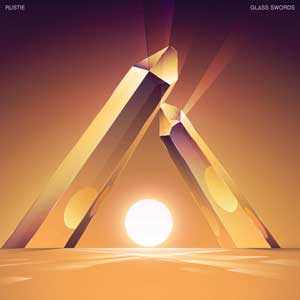Rustie Glass Swords
Glass Swords, the debut full-length from Glaswegian producer Rustie, is many things, but it’s not […]

Glass Swords, the debut full-length from Glaswegian producer Rustie, is many things, but it’s not subtle. If certain albums are exercises in restraint, this LP is essentially the polar opposite of that. No matter how the album is ultimately viewed and judged, nobody will be saying that Rustie didn’t really go for it. It’s bombastic, it’s vibrant, it’s neon, it takes an everything-and-the-kitchen-sink approach, and it’s also stunningly good.
Hailing from Glasgow, Rustie (a.k.a. Russell Whyte) comes from the same music-making school as Hudson Mohawke and the Numbers crew, a lineage that rapidly becomes apparent when listening to Glass Swords. The music is nearly impossible to shoehorn into a single style or sound, as there are elements of warped hip-hop, skronky ’80s funk, epic trance, 16-bit nostalgia, proggy grandiosity, and so much more. Most of the album’s 13 tracks clock in around the three- or four-minute mark, yet so many ideas are crammed into each piece, setting up Rustie as the perfect poster boy producer for the ADD generation.
Nevertheless, this busied aproach, while potentially overwhelming, should not be mistaken for sloppiness or laziness. Glass Swords sounds amazing, particularly on “Ultra Thizz,” a clear standout that combines classic rave builds with punchy synth stabs and alien R&B to form a futuristic and delightfully over-the-top slice of hypercolor bass music. “Cry Flames” and “All Nite” flash a similar low-end swagger, the former an ostentatious dose of prog-hop and the latter a fuzzed-out take on chic ’80s electro-funk. One of the keys to Glass Swords‘ success is Rustie’s ability to effectively mine retro cheese, particularly on the album’s frequent nods to big-room trance. The swirling, cascading synth melodies on songs such as “Hover Traps,” “Death Mountain,” and “After Light” could only be described as tacky on their own, but when combined with Rustie’s growling bass, hyperactive beat work, and inventive song structure, the resulting tracks sound fresh and unique.
In truth, there aren’t much in the way of low points on Glass Swords. The beatless title track offers a dense blast of proggy exploration, and “Flash Back” sounds like the long-lost soundtrack to a great Sega Genesis side-scroller, only flipped for the club. “City Star” is a punishing hip-hop instrumental fueled by alternating synth squeal and blap, while album closer “Crystal Echo” is an oddly wisftul piece of videogame R&B. Rustie tries so many things on this record, and, somehow, just about all of them work. Yet the album never seems disjointed or slapped together; Glass Swords feels and sounds like a cohesive statement, and a strong one at that.

